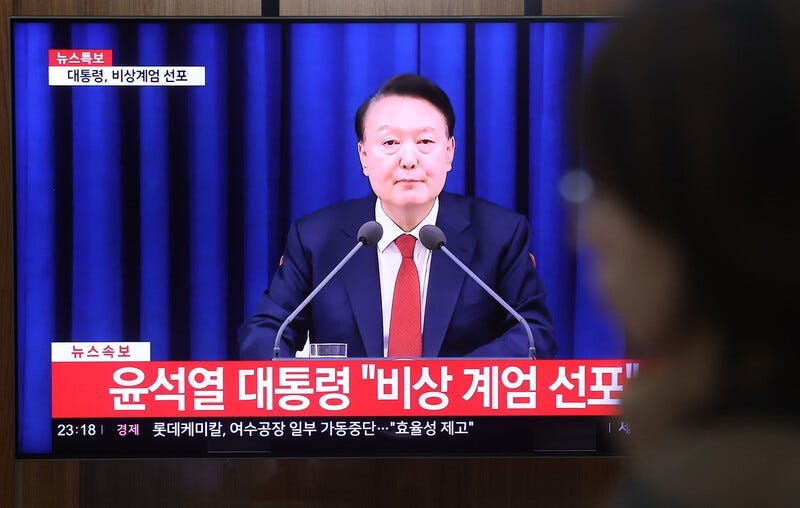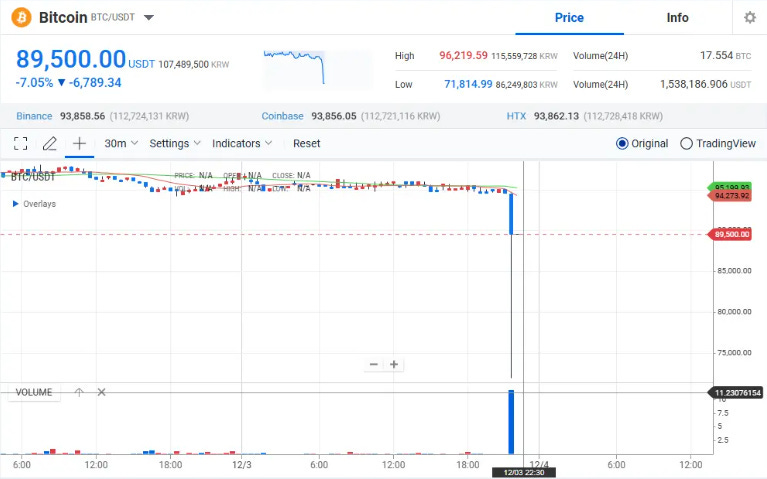This opinion article does not contain political opinions regarding the recent martial law situation in South Korea. We only focus on the impact and short-term outlook on the blockchain and cryptocurrency investment market.
Market shock: The declaration of martial law caused a massive drop in local cryptocurrency exchanges. The total sale price was approximately $33.3 billion. The price of Bitcoin fell to $62,300, and the local market briefly recorded the highest trading volume in the world.
Investor outflow: Due to price instability and system crashes on domestic exchanges, Korean investors are expected to turn to overseas exchanges and DeFi platforms.
Industry contraction: Political instability has forced Korean blockchain projects to move overseas. Major legislation such as the Virtual Asset User Protection Act is likely to face delays.


Last night’s sudden declaration and lifting of martial law by President Yoon Seok-yeol shocked the South Korean virtual currency market. On Upbit, the country’s largest exchange, the price of Bitcoin fell to $62,300. South Korea’s two largest exchanges, Upbit and Bithumb, recorded 24-hour trading volumes of $26.9 billion and $6.4 billion, the highest levels this year. These numbers reflect the massive sell-off by Korean investors following the declaration. During this period, South Korean exchanges briefly ranked first in the world by trading volume. This highlights the extreme volatility of the Korean market.
The martial law situation has seriously damaged confidence in South Korea’s won-based assets. With the withdrawal of foreign capital, stock and bond market volatility is likely to increase. As a result, investors are shifting their focus to decentralized assets like cryptocurrencies.
As geopolitical risks increase, investors are turning to cryptocurrencies to protect their assets. Bitcoin and other major cryptocurrencies are of interest because they operate independently of government control. In past crises, such as the Hong Kong protests and the war between Russia and Ukraine, cryptocurrencies have served as a safe haven.
Korean cryptocurrency exchanges maintain high security through strict travel rules and KYC (Know Your Customer) regulations. Measures against money laundering (AML) have been strengthened under the Act on Reporting of Specified Financial Transaction Information. Investor protection has also been strengthened. These efforts have established South Korea as a leader in regulatory compliance.

However, this accident exposed the double-edged sword of stricter regulations. Strict rules maintain a reverse kimchi premium. This widened the price gap with the global market, making it difficult for investors to make rational decisions.
Plunging prices on local exchanges and system instability undermined investor confidence. Upbit and Bithumb experienced server crashes as overnight trading volume reached $33.3 billion. Unlike overseas exchanges, this volatility made local exchanges appear unreliable to investors.
These issues are expected to accelerate the migration of Korean investors to overseas exchanges and DeFi platforms. Binance and Coinbase offer a stable trading environment and a variety of financial products. These features make it an attractive option for Korean investors.
Political instability is expected to have a negative impact on the investment environment for blockchain projects in South Korea. Many major projects have already moved overseas, and this trend is likely to continue. Nexpace, Nexon’s blockchain division, has moved to Abu Dhabi. Klaytn and LINE Finschia’s Kaia Foundation has moved to Singapore. Wemade’s Wemix has moved to Dubai. These companies chose blockchain-friendly countries to avoid regulatory uncertainty and political risks in South Korea. It is expected that more projects will move to Singapore and the UAE, where regulations are clear and stable.
The overseas relocation of blockchain startups has raised concerns about a potential brain drain. This trend could weaken the competitiveness of South Korea’s blockchain industry. With Web3 and blockchain technology advancing rapidly, the loss of talent could have a long-term negative impact on South Korea’s technological advantage. This leak has created a growing sense of crisis within the industry.
Major bills are also expected to be delayed due to the impeachment issue. Legislation like the Virtual Asset User Protection Act, which is currently under consideration in Congress, is likely to face setbacks. These delays may further hinder the institutionalization of South Korea’s crypto market.
The martial law situation has exposed the structural weaknesses of South Korea’s cryptocurrency market. Overnight, $33.3 billion worth of trades disappeared, and servers at major exchanges went down. Extreme price fluctuations occurred, resulting in large price differences compared to global exchanges. These events highlighted the political risks in the market and the fragility of the current trading system under stress.
Market volatility is expected to continue in the short term. However, if there are appropriate institutional improvements and institutional enhancements, this could become a turning point. Such initiatives could strengthen the stability of South Korea’s cryptocurrency ecosystem and promote globalization. Future developments will be watched closely.
Read more reports related to this study.
This report has been prepared based on material believed to be reliable. However, we do not guarantee the accuracy, completeness, or suitability of the information, express or implied. We are not responsible for any loss arising from the use of this report or its contents. The conclusions and recommendations in this report are based on information available at the time of preparation and are subject to change without notice. All projects, estimates, forecasts, objectives, opinions and views expressed in this report are subject to change without notice and may differ from or be contrary to those of other people or organizations.
This document is for informational purposes only and does not constitute legal, business, investment, or tax advice. References to securities or digital assets are for illustrative purposes only and do not constitute an investment recommendation or the provision of investment advisory services. This material is not intended for investors or potential investors.
Tiger Research allows fair use of the report. “Fair use” is a general principle that allows certain content to be used for public benefit purposes as long as the commercial value of the material is not compromised. Reports may be used without prior permission as long as the use is consistent with the purpose of fair use. However, when citing a Tiger Research report, please 1) clearly state “Tiger Research” as the source, and 2) include the Tiger Research logo (black/white). If you wish to reconfigure and publish it, separate negotiations will be required. Unauthorized use of reports may result in legal action.



 Home →
Home →